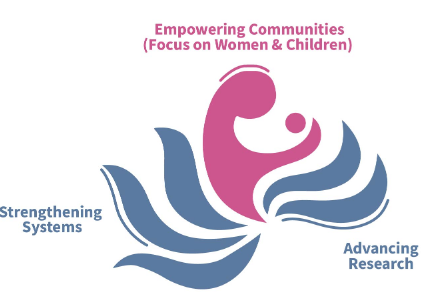187,839
Pregnant women
assisted through various programs
(2016-25)
Health Equity amongst the urban poor can be a powerful agent of change. Similar to health being critical to a child's development, health equity is an indispensable milestone of a community's development. This can be achieved by strengthening the community's capacity to access public health services while working with public health systems to provide quality services and by changing knowledge, attitudes and behaviours. SNEHA (Society for Nutrition, Education and Health Action) is a step towards bridging the health equity gap and going beyond fighting illness to Raising Health For All.
A Continuum of Care Approach
A continuum of care RMNCH+A (Reproductive, Maternal, Newborn, Child and Adolescent Health) means working with women and children from birth to adulthood in order to break the intergenerational cycle of poor health.
Addressing gender-based inequities is an underlying area of focus across all programmes that SNEHA undertakes, because this is often at the heart of health inequity in communities.
SNEHA works with vulnerable communities, public health and safety systems
to develop evidence-based models to address urban health challenges.
Maternal and Child Health
Know MoreWe work with communities to address health and nutrition challenges among mothers and children through a continuum of care approach.
Public System Partnership
Know MoreWe work with public systems to strengthen delivery of services to vulnerable communities.
Public System Partnership
Empowerment, Health and Sexuality of Adolescents
Know MoreWe work on improving the health and well-being of adolescents and building an adolescent friendly health ecosystem.
Empowerment, Health and Sexuality of Adolescents
Prevention of Violence against Women and Children
Know MoreWe work with communities and public systems to prevent and address gender-based violence in a holistic manner.
Prevention of Violence against Women and Children
EMPOWERING COMMUNITIES
SNEHA works directly with vulnerable communities to improve health seeking behaviours, address gender inequities and promote optimal use of available resources.
STRENGTHENING SYSTEMS
SNEHA’s model is unique as it supports existing government health and safety systems for improving quality of healthcare delivery.

ADVANCING RESEARCH
SNEHA highly values ‘Research, Monitoring & Evaluation and
Impact Mapping’ ,
seeing these as enablers of efficiency and accelerators of change. At a larger level, it works towards creation of evidence-based models of health interventions to inform policy.
We have expanded into nurse-aide training to empower young women and into palliative care to help communities manage life limiting illnesses better; supported by expertise and compassion.
Romila Palliative Care Nurse-Aide programmePregnant women
assisted through various programs
(2016-25)
Children screened
for malnutrition
(2016-25)
Reduction in wasting
among children aged 0-5 years
(2022-25)
Maternity cases
are referred appropriately
(2024-25)
Reduction in
maternal anemia
(2022-25)
Improvement in adequate
dietary diversity among adolescents
aged 10-16 years
(2022-25)
Survivors of gender-based
violence reported a reduction in violence levels
(2024-25)
Blog
Nov 7, 2025
Building Trust, Protecting Futures: How Community Volunteers Strengthen Immunization in Urban Slums
Through its long-term interventions in Mumbai’s M/East ward, SNEHA has built bridges between families, health workers, and systems. Its trained community volunteers— known as Community Action Group (CAG) members— are at the heart of this effort, working tirelessly to ensure no child is left behind.
Media
Nov 13, 2025
Community interventions to prevent violence against women and girls in informal settlements in Mumbai: a theory-driven, pragmatic, cluster-randomised, controlled trial
Co-authored by SNEHA leadership; published by Elsevier in The Lancet Global Health, Volume 13, Issue 12.
Social Media
Nov 15, 2025
Course Alert: Community Mobilisation to Prevent Violence Against Women & Girls
Violence against women and girls is a pervasive issue, but transforming communities transforms systems. Apply for the FREE online course on Community Mobilisation to Prevent Violence Against Women and Girls, presented by SNEHA Knowledge Center.